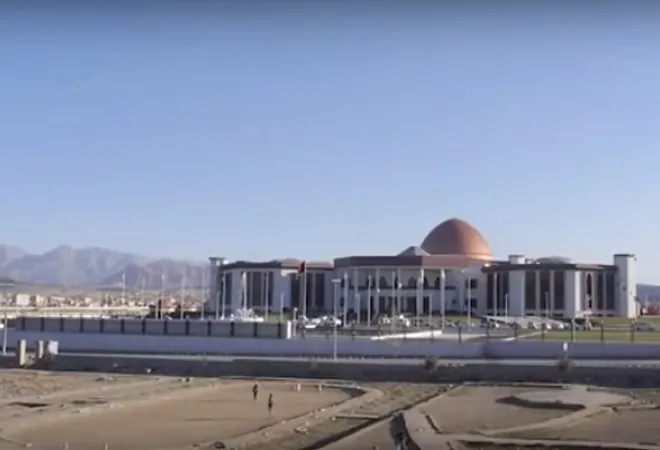
In his latest press briefing, US President Donald Trump belittled India’s assistance to help build a library in Afghanistan. Media reports have already indicated that this assertion is inaccurate and reeks of Mr. Trump’s ignorance. For many in the Indian strategic community, the comment by President Trump comes as a shock, given the fact that India has contributed immensely and meaningfully in the developmental efforts for Afghanistan. President Trump, at least on this occasion, seems to have suffered aneurysm, as he had himself, while addressing his troops at Fort Myer in August 2017, appreciated India’s efforts in Afghanistan and stated that the US wants “India to help us more with Afghanistan in the area of economic assistance and development”. It needs to be realised by President Trump that India has always preferred to remain modest about its role.
India has always insisted on taking a backseat on the unfolding situation in Afghanistan and play a silent, yet effective, role in the non-military sphere.
However, it comes as no surprise that India’s contribution for nation-building in Afghanistan is perceived by President Trump as miniscule when compared to United States’ efforts, which has largely been confined to bombing towns and villages in the name of providing security. The US President seems to be towing the line of previous US administrations, which in the last 17 years, went overboard in safeguarding Pakistan’s sensitivities about Indian involvement in Afghan affairs. In his book titled Directorate S: The C.I.A. and America’s Secret Wars in Afghanistan and Pakistan, 2001-2016 , author Steve Coll narrates how just prior to the US intervention in Afghanistan in 2001, the then Pakistan President General Pervez Musharraf had strongly insisted on omitting India from the American security strategy. The Bush and Obama administrations readily honoured these commitments and ensured that India was kept at an arm’s length in the US’ Afghan strategy throughout their tenures.
Distancing itself from India enabled the United States to prosecute the war and enlist Pakistan’s logistical and military help, but precluded the encashment of critical Indian insights on Afghanistan’s dynamics.
These misplaced sensitivities of the United States towards India kept the latter from gaining a larger developmental footprint and an expanded mandate in the region. And look at the results today. After 17 years of maintaining its presence in Afghanistan, the ground situation for the United States and its allies hasn’t changed much. Violence in Afghanistan continues to increase, attacks in Kabul refuse to cease, Taliban has bounced back and is negotiating from a position of strength and the operational capabilities of Afghan National Army remains questionable. President Trump’s decision to pullout American troops at this juncture also hints of lack of prudence and sincerity. While the troop withdrawal decision seems like Mr. Trump simply pandering to his election promise, it also gives rise to numerous risks – which, besides opening up Afghanistan to Pakistan and the US’ strategic rivals Russia and China – also seems like the US conceding to Afghan Taliban’s demands, if not a full admission of defeat.
Therefore, at this critical phase of the Afghan conflict, it would make better sense for the US to recognise the salience of India’s non-military approach towards conflict resolution in Afghanistan. India has made the most of the limited space that was granted to it, and that too, in an extremely difficult environment. India focused on small developmental projects and community-development programmes covering wide-ranging sectors. With each development project, India has gained a foothold of credibility and goodwill in the minds of the Afghan people and strengthened the domestic dispensation in the war-ravaged country. The strength of India’s developmental initiatives in Afghanistan lies in their sustainability and grass-root penetration.
Amidst the incessant violence in and around Kabul and the rest of the countryside, these Indian-built developmental projects stand out as the oases of stability and endurance.
Perusal of Kallol Bhattacherjee’s book The Great Game in Afghanistan Rajiv Gandhi, General Zia and the Unending War presents an interesting phase in Indo-US relations, wherein the US leadership in the 1980s sought India’s assistance to discuss Soviet withdrawal from Afghanistan. It would also be interesting to recall an article by renowned journalist Shekhar Gupta, wherein he reveals how the then Prime Minister of India Narasimha Rao was so well-conversant with the intricacies and challenges of domestic affairs of Afghanistan. It is precisely this rich heritage of knowledge and experience, which India has, that a succession of American administrations have denied themselves.
But the Afghans know this aspect of India. And they appreciate the quiet and positive approach of India in their country. Which is why, the Afghan National Security Adviser is expected to hold talks on security issues with his Indian counterpart Ajit Doval this week. Instead of ranting about India’s contribution to the cause in Afghanistan, it would perhaps be wise for the US administration to pressurise Islamabad to open a channel of communication with New Delhi and adopt a more realistic approach towards Afghanistan. It is baffling to see how Pakistan recently dispatched Foreign Minister Shah Mehmood Qureshi on a four-nation tour that included Afghanistan, China, Iran and Russia. In fact, Pakistan Prime Minister Imran Khan is visiting Turkey wherein Afghanistan would figure as an important agenda of discussion. It is disappointing to see how the Pakistanis are ready to talk to regional and extra-regional powers, but have denied themselves the opportunity of talking to India on any resolution to the Afghan problem.
If Imran Khan is truly insistent on rapprochement with India and doing things differently, then he should shed the historical baggage of not discussing Afghanistan with India.
Bottom-line remains that India is critical for any evolving security architecture in Afghanistan post the American withdrawal. It would perhaps serve President Trump well to facilitate a greater role for India than ridiculing its efforts.
The views expressed above belong to the author(s). ORF research and analyses now available on Telegram! Click here to access our curated content — blogs, longforms and interviews.




 PREV
PREV


